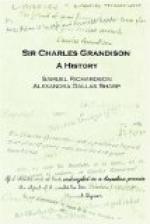My lord was greatly pleased with what his nephew said.
Upon some occasion, Lady G—— reflected upon a lady for prudery, and was going on, when Sir Charles, interrupting her, said, Take care, Lady G——. You, ladies, take care; for I am afraid, that modesty, under this name, will become ignominious, and be banished the hearts, at least the behaviour and conversation, of all those whose fortunes or inclinations carry them often to places of public resort.
Talk of places of public resort! said Lord L——: It is vexatious to observe at such, how men of real merit are neglected by the fine ladies of the age, while every distinction is shewn to fops and foplings.
But, who, my lord, said Sir Charles, are those women? Are they not generally of a class with those men? Flippant women love empty men, because they cannot reproach them with a superiority of understanding, but keep their folly in countenance. They are afraid of a wise man: but I would by no means have such a one turn fool to please them: for they will despise the wise man’s folly more than the silly man’s, and with reason; because being uncharacteristic, it must sit more awkwardly upon him than the other’s can do.
Yet wisdom itself, and the truest wisdom, goodness, said Mrs. Reeves, is sometimes thought to sit ungracefully, when it is uncharacteristic, not to the man, but to the times. She then named a person who was branded as a hypocrite, for performing all his duties publicly.
He will be worse spoken of, if he declines doing so, said Dr. Bartlett. His enemies will add the charge of cowardice; and not acquit him of the other.
Lady Gertrude being withdrawn, it was mentioned as a wonder, that so agreeable a woman, as she must have been in her youth, and still was for her years, should remain single. Lord G—— said, that she had had many offers: and once, before she was twenty, had like to have stolen a wedding: but her fears, he said, since that, had kept her single.
The longer, said Sir Charles, a woman remains unmarried, the more apprehensive she will be of entering into the state. At seventeen or eighteen a girl will plunge into it, sometimes without either fear or wit; at twenty she will begin to think; at twenty-four will weigh and discriminate; at twenty-eight will be afraid of venturing; at thirty will turn about, and look down the hill she has ascended; and, as occasions offer, and instances are given, will sometimes repent, sometimes rejoice, that she has gained that summit sola.
Indeed, said Mrs. Reeves, I believe in England many a poor girl goes up the hill with a companion she would little care for, if the state of a single woman were not here so peculiarly unprovided and helpless: for girls of slender fortunes, if they have been genteelly brought up, how can they, when family connexions are dissolved, support themselves? A man can rise in a profession, and if he acquires wealth in a trade, can get above it, and be respected. A woman is looked upon as demeaning herself, if she gains a maintenance by her needle, or by domestic attendance on a superior; and without them where has she a retreat?




